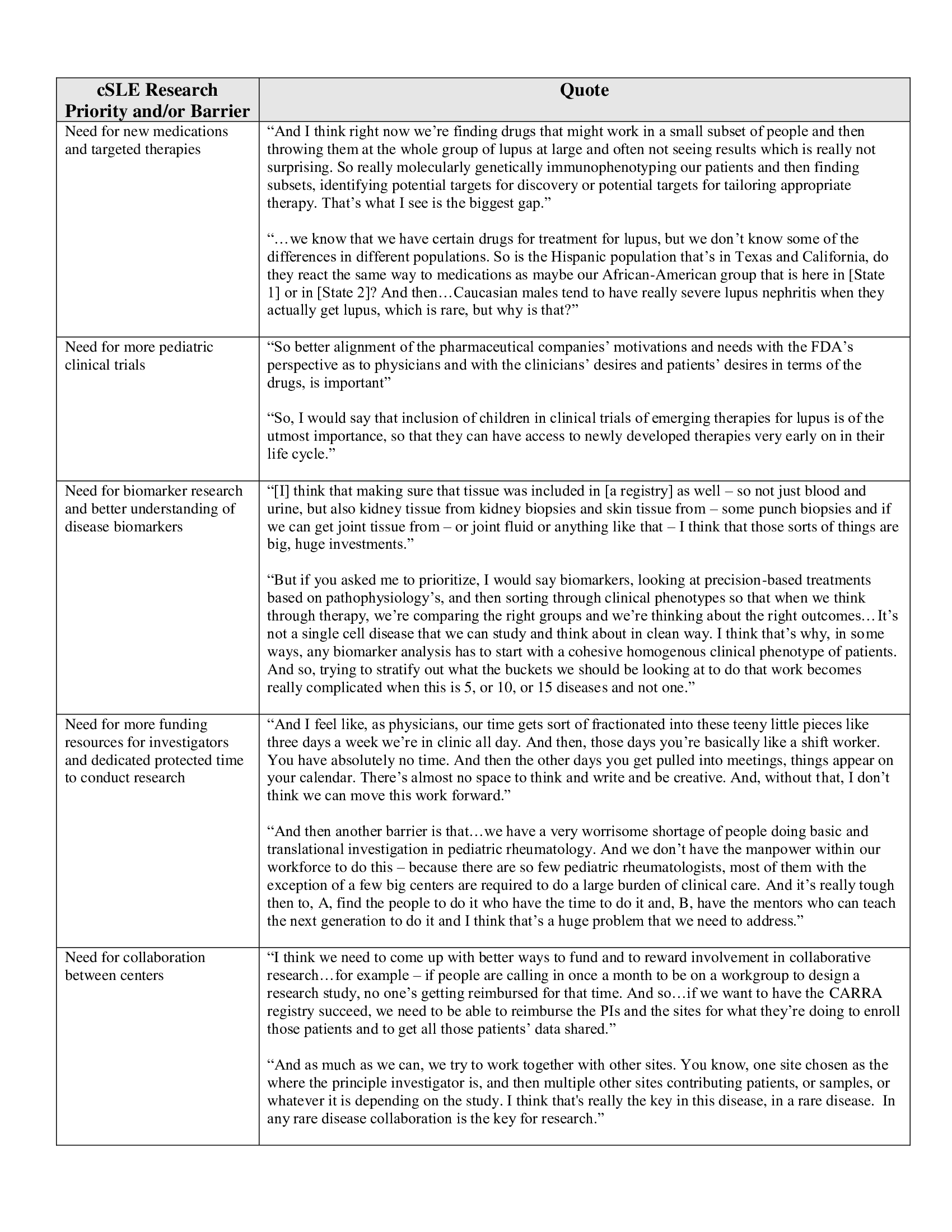Session Information
Date: Monday, November 9, 2020
Title: Pediatric Rheumatology – Clinical Poster III: SLE, Vasculitis, & JDM
Session Type: Poster Session D
Session Time: 9:00AM-11:00AM
Background/Purpose: An estimated 15 to 20% of patients with systemic lupus erythematosus (SLE) have childhood-onset SLE (cSLE). Given the early onset of cSLE, patients often experience significant burden due to cSLE disease, comorbidities and immunosuppressive treatment. There is a pressing need for high quality, comprehensive research efforts to define the natural history, best treatments, access to care and disparities in care for cSLE patients. Building on a previously published survey study of clinicians caring for cSLE patients to describe research priorities in cSLE, the primary objective of this study was to conduct expert interviews to define a cSLE research agenda.
Methods: Individuals with identified expertise in cSLE were recruited worldwide using a purposive sampling technique including providers from several disciplines: pediatric rheumatology, pediatric nephrology, dermatology, psychiatry, medicine/pediatrics, and adolescent medicine. Experts participated in open-ended, semi-structured qualitative interviews. Interviews were designed to elicit expert perspectives on research priorities, optimal research approaches, and factors that facilitate and hinder advancing cSLE research. Interviews were digitally recorded, transcribed, and de-identified for qualitative analysis. 30 interviews were conducted between January and May 2020. Analysis for underlying themes of cSLE expert perspectives was performed using a constant comparative approach in which summaries and themes of each expert’s interview transcript informed the presence or absence of themes in subsequent cases (iteration). Two researchers conducted the analysis. To establish a consistent identification of themes, the first third of transcripts were analyzed by both researchers. The remaining transcripts were summarized by one researcher followed by a review from the second researcher to look for any missed additional elements.
Results: Several notable themes emerged from analysis of the interview data, supported by illustrative quotes (Table). A salient priority identified among interviewees was the importance of better (and more targeted) treatment for cSLE. Two major barriers to the development of new therapies were lack of pediatric clinical drug trials and need for biomarker research. Interviewees also identified individual investigator barriers to performing cSLE research, including obtaining funding to conduct projects, and having adequate time to conduct research. Last, collaboration was identified as a necessity within the cSLE research community, recognizing The Childhood Arthritis and Rheumatology Research Alliance (CARRA) as a powerful tool for multi-center collaboration in cSLE research.
Conclusion: cSLE expert interviewees identified the need for improved targeted therapies through pediatric clinical drug trials and biomarker research as well as collaboration between researchers and centers as research priorities. Funding and protected time for research are major individual barriers to involvement in cSLE research.
 Table: Illustrative quotes from cSLE providers discussing research priorities and barriers to advancement of research for cSLE.
Table: Illustrative quotes from cSLE providers discussing research priorities and barriers to advancement of research for cSLE.
To cite this abstract in AMA style:
Cannon L, Skelley-Caliendo A, Hersh A, Knight A. Elucidating Research Priorities in Childhood-Onset Systemic Lupus Erythematosus: A Qualitative Study [abstract]. Arthritis Rheumatol. 2020; 72 (suppl 10). https://acrabstracts.org/abstract/elucidating-research-priorities-in-childhood-onset-systemic-lupus-erythematosus-a-qualitative-study/. Accessed .« Back to ACR Convergence 2020
ACR Meeting Abstracts - https://acrabstracts.org/abstract/elucidating-research-priorities-in-childhood-onset-systemic-lupus-erythematosus-a-qualitative-study/
